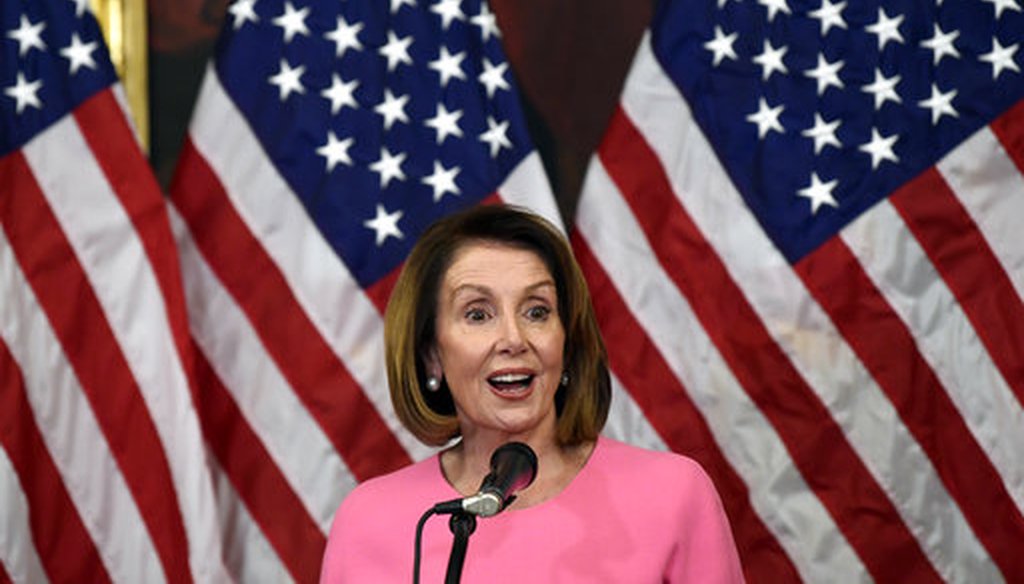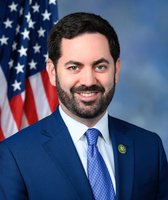Stand up for the facts!
Our only agenda is to publish the truth so you can be an informed participant in democracy.
We need your help.
I would like to contribute

House Minority Leader Nancy Pelosi, D-Calif., speaks during a news conference on Capitol Hill on Nov. 7, 2018. (AP/Susan Walsh)
The election’s over, with the Democrats winning the House and losing a few seats in the Senate.
Now what?
The Democratic caucus in the House will have diverse interests. Some new lawmakers come from the party’s more liberal wing, such as Rep.-elect Alexandria Ocasio-Cortez of New York, a self-described socialist. But many of the winners on Election Night got to Congress by flipping suburban seats previously held by Republicans.
That means Democrats may struggle to come together on both substantive and stylistic grounds, congressional observers say.
"My sense is that the Democratic caucus will be aggressive," said Richard E. Cohen, the author of the Almanac of American Politics who has authored biographies of the incoming congressional freshmen. "Whether they are coherent—and productive—remains to be seen."
Sign up for PolitiFact texts
With that in mind, here’s a look at legislative areas where the Democratic House might collaborate with Republicans in the Senate and President Trump. We’ll also look at areas where they might conflict.
Possible areas of common ground
Divided government has sometimes served as a catalyst for progress on legislation, such as the 1986 tax reform act and the 1996 welfare reform bill. The House, in particular, is a chamber where the majority party can chart its own destiny.
"The parties are far apart on many bigger issues, so the opportunities to get something done are more limited," said John C. Fortier, director of the Democracy Project at the Bipartisan Policy Center. "That being said, there are opportunities for finding issues that both sides support."
Some examples:
• Modest health care legislation. During her post-election news conference, current minority leader (and possible future House Speaker) Nancy Pelosi began by saying, "Health care was on the ballot, and health care won."
The House might pass a bill to repair and strengthen the Affordable Care Act, said Charles Tiefer, a former counsel for the House who now teaches law at the University of Baltimore.
Other narrow legislation could follow on the model of the recently enacted opioid bill, said University of Miami political scientist Gregory Koger. This bill passed with overwhelming majorities in both chambers.
One possibility is prescription drug price relief. Lowering drug prices is a policy that Trump has advocated, and if anything, it is historically an issue articulated by Democrats at least as much as by Republicans. Pelosi mentioned the issue in her news conference. "There is a lot of momentum right now around reducing drug prices," said Christine Eibner, a health policy analyst at the RAND Corp.
"Good leadership can find opportunities," said Eugene Steuerle, a fellow at the Urban Institute. "They should really be more than technical amendments, but at least technical amendments would be a start."
• Infrastructure. During Trump’s first term, the initiation of "infrastructure week" became a running joke, because it always seemed like some high-profile controversy drew attention away from any actual initiative.
"Infrastructure, which has been talked about constantly, still might be a possibility" if it is not taken up in the lame-duck session later this year," Fortier said. Pelosi mentioned this in her post-election news conference as well.
The obstacle is that "it costs money, and President Trump and the GOP have already exploded the deficit by lowering taxes," Koger said. "A major infrastructure bill would probably have to revisit the 2017 tax law, which will probably lead to a stalemate in the short run."
• The military. "The defense budget is relatively non-controversial and has far too many industry lobbyists involved for it not to make it to the finish line," said John Pike, director of globalsecurity.org. "Unlike some prior years, there are no evident partisan divides on force levels or individual programs. There may be some grandstanding along the way, but not enough to interfere with the sausage factory."
The energized progressive wing of the new Democratic majority, however, may take a closer look at the United States’ presence in Afghanistan, which could be controversial.)
A possible alternative agenda
At her news conference, Pelosi said, "We’re not going for the lowest common denominator -- we’re going for the boldest common denominator."
Still, rather than seeking cooperation, House Democrats may instead try to lay down a marker with their own agenda, which -- once it’s blocked in the Republican-controlled Senate -- could form the basis for a 2020 presidential platform.
"It remains to be seen whether Democrats would be interested in advancing policy ideas as opposed to spending their time challenging President Trump," said Nicole M. Kaeding, the director of federal projects with the Tax Foundation.
One possible element might be immigration legislation, such as protections for "dreamers" who came to the United States with their parents as minors and who do not have legal status.
Other elements of an agenda could be a renewal of the Voting Rights Act; a campaign finance overhaul; a minimum wage increase; changes to the 2017 tax law; and steps to tackle climate change.
Use of the House’s oversight powers
Something that House Democrats could accomplish without Republican cooperation is oversight on the executive branch, including Trump himself. Indeed, House Democratic leaders are already considering how broad their oversight efforts should be.
"House committees can hold hearings with witnesses with knowledge of the Russian or other scandals, such as (former Trump advisers) Paul Manafort or Michael Cohen," Tiefer said. "They could also look at his use of tax loopholes, his business ties with foreign countries, and his receipt of payments that could violate the Emoluments Clause."
Beyond Trump himself, Democratic lawmakers could ratchet up oversight of his agencies. The Environmental Protection Agency and the Interior Department would be some of the biggest targets for their anti-regulatory efforts, along with immigration enforcement by the Department of Homeland Security and enforcement of the Affordable Care Act by the Department of Health and Human Services.
"House oversight of Trump's political appointees at environmental agencies will be a game-changer," said Jeremy Symons, an environmental policy consultant.
It remains unclear whether these oversight efforts could morph into impeachment proceedings against Trump. If they did, they could have minuses for House Democrats, Tiefer said.
"An impeachment vote might cross-pressure centrist Democrats who just barely won in the 2018 election and who do not want their 2020 opponents to define them by that one polarizing issue," he said. "Moreover, Democrats may decide that the better way to work to end the Trump presidency is to campaign in 2020 against his re-election."
Pelosi, for her part, has consistently said she’s skeptical of impeachment, calling such an effort "divisive."
"If the facts are there, the facts are there, then this would have to be bipartisan to go forward," she told CNN’s Chris Cuomo in May. "But if it is viewed as partisan, it will divide the country. And I just don't think that that's what we should do."
Our Sources
USA Today, "Trump braces for Democratic House following midterm elections," Nov. 6, 2018
Huffington Post, "Democrats Want To Take On The War In Afghanistan If They Win The House," Nov. 6, 2018
Washington Examiner, "Nancy Pelosi is still not interested in your impeachment fantasies," May 24, 2018
Email interview with Tim Boersma, senior research scholar at Columbia University’s Center on Global Energy Policy, Nov. 6, 2018
Email interview with Gail Wilensky, head of Medicare and Medicaid under President George H.W. Bush, Nov. 6, 2018
Email interview with Jeremy Symons, environmental policy consultant, Nov. 6, 2018
Email interview with Richard E. Cohen, author of the Almanac of American Politics, Nov. 6, 2018
Email interview with John C. Fortier, director of the Democracy Project at the Bipartisan Policy Center, Nov. 6, 2018
Email interview with Eugene Steuerle, fellow at the Urban Institute, Nov. 6, 2018
Email interview with Charles Tiefer, professor of law at the University of Baltimore, Nov. 6, 2018
Email interview with Christine Eibner, a health policy analyst at the RAND Corp., Nov. 6, 2018
Email interview with Gregory Koger, University of Miami political scientist, Nov. 6, 2018
Email interview with Nicole M. Kaeding, director of federal projects with the Tax Foundation, Nov. 6, 2018
Email interview with John Pike, director of globalsecurity.org, Nov. 6, 2018












































